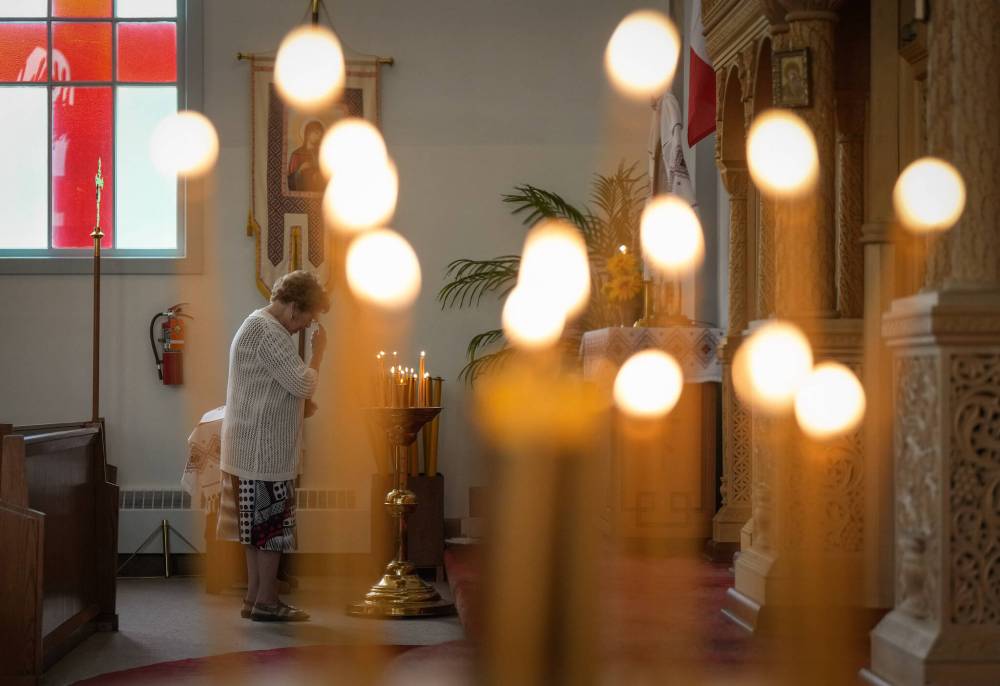Entertainment
Global Research Examines Decline of Organized Religion Worldwide

Organized religion is experiencing a notable decline in Canada and around the world, according to a recent paper titled “The three stages of religious decline around the world.” The study, authored by scholars Jörg Stolz, Nan Dirk de Graaf, Conrad Hackett, and Jean-Philippe Antonietti, utilizes data from the Pew Research Centre, the World Values Survey, and the European Values Study to outline the factors contributing to this trend.
The authors propose that the decrease in religious affiliation occurs through a process they refer to as a “secular transition.” Initially, religion plays a significant role in the identity, community, morality, and meaning of life in many societies. However, as societies modernize, urbanize, and become more educated, reliance on religious authority diminishes.
A significant element in this shift is generational change. Each succeeding generation tends to exhibit lower levels of religious commitment, as young people are exposed to greater individual choices regarding faith and experience less societal pressure to maintain religious practices. Additionally, as societies become more diverse, no single faith tends to dominate, leading to a perception of religion as a personal option rather than a societal obligation.
The Three Stages of Decline
The authors articulate that the transition from a religious to a less religious society unfolds in three distinct stages. In the initial stage, individuals begin to disengage from practices that require substantial time and resources, such as attending religious services. Subsequently, beliefs often become less central to identity as participants are not regularly reinforced by religious environments. The final stage involves the retention of religious identity without active participation; individuals may identify as Christians, Muslims, Jews, Hindus, or Buddhists, despite a lack of belief or attendance.
Recent statistics in Canada illustrate this trend. Over 34 percent of Canadians, particularly younger demographics, identify as “nones,” or individuals not affiliated with any religious group. The decline in religious service attendance is evident, with less than 10 percent of Canadians attending services regularly, a trend that has been present since the 1960s.
Notably, the authors emphasize that this secular transition model does not predict the eradication of religion. Instead, they argue that while societies may become less religious over time, religion itself does not disappear entirely.
Regional Variations and Future Implications
The study acknowledges that some regions deviate from this transition model, notably post-communist Eastern European countries with significant religious populations, such as Russia and Azerbaijan. In these places, the revival of traditional religious beliefs is often linked to the aftermath of decades of suppressed religious expression. Conversely, in Israel, a considerable portion of the population identifies as secular; however, a substantial number of younger Israelis are also Orthodox, indicating a complex religious landscape.
In assessing Canada’s position, the authors view it as being in the middle-to-late stages of the secular transition process. The potential influence of immigration on religious affiliation is also noted, as many immigrants tend to be more religious. This influx could temporarily bolster certain minority religions, such as Islam, although research suggests that Canadian-born Muslim youth often display lower levels of religiosity than their parents.
The authors predict that by 2050, Canada may resemble Scandinavian countries, where religion is regarded more as a cultural heritage than a practice. This evolution presents challenges for Canadian religious leaders, who must navigate a landscape where religion is increasingly viewed as irrelevant by much of the population.
The implications extend beyond religious institutions; studies indicate that higher levels of religiosity correlate with increased charitable giving and community engagement. Furthermore, youth involved in religious groups are less likely to engage in delinquent behaviors or substance abuse.
This ongoing transition raises critical questions for religious leaders, policymakers, and society as a whole. As Canada continues to evolve in its religious landscape, the dialogue surrounding the role of faith in public life will become increasingly important.
For further insights, the study is available at pewresearch.org.
-

 World3 months ago
World3 months agoScientists Unearth Ancient Antarctic Ice to Unlock Climate Secrets
-

 Entertainment4 months ago
Entertainment4 months agoTrump and McCormick to Announce $70 Billion Energy Investments
-

 Lifestyle3 months ago
Lifestyle3 months agoTransLink Launches Food Truck Program to Boost Revenue in Vancouver
-

 Science4 months ago
Science4 months agoFour Astronauts Return to Earth After International Space Station Mission
-

 Technology2 months ago
Technology2 months agoApple Notes Enhances Functionality with Markdown Support in macOS 26
-

 Top Stories3 weeks ago
Top Stories3 weeks agoUrgent Update: Fatal Crash on Highway 99 Claims Life of Pitt Meadows Man
-

 Sports4 months ago
Sports4 months agoSearch Underway for Missing Hunter Amid Hokkaido Bear Emergency
-

 Politics3 months ago
Politics3 months agoUkrainian Tennis Star Elina Svitolina Faces Death Threats Online
-

 Technology4 months ago
Technology4 months agoFrosthaven Launches Early Access on July 31, 2025
-

 Politics3 months ago
Politics3 months agoCarney Engages First Nations Leaders at Development Law Summit
-

 Entertainment3 months ago
Entertainment3 months agoCalgary Theatre Troupe Revives Magic at Winnipeg Fringe Festival
-

 Politics3 weeks ago
Politics3 weeks agoShutdown Reflects Democratic Struggles Amid Economic Concerns









